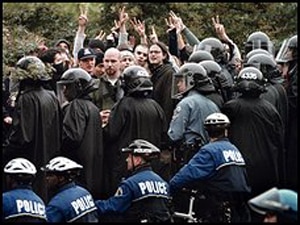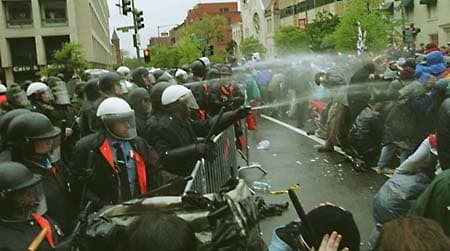Background
Class action impact litigation brought by the Partnership for Civil Justice Fund on behalf of more than 700 people, including anti-IMF demonstrators, journalists, tourists, and passersby, led to major and substantive reform in police policies and practices in the handling of mass demonstrations in Washington, D.C. During the litigation, the PCJF successfully fought to end both D.C. and federal police department use of the “trap-and-detain” arrest tactic whereby the police would use police lines to suddenly surround and mass arrest entire groups of people in proximity to free speech activities.
The outcome of the litigation by the PCJF, including major changes to laws governing police conduct, was hailed as “historic” and a “benefit for future generations” by the federal court.

On April 15, 2000, nearly 700 persons were arrested during a lawful and peaceful march on the first of several days of protests, known as A16, against the IMF and World Bank. The police threw up police lines, prohibited anyone from leaving, and arrested everyone solely because they had engaged in First Amendment protected activity or because they were in proximity to free speech in the nation’s capital.
Children were handcuffed and taken away from their parents. Many arrestees were held on stifling buses for eight hours with their hands cuffed tightly behind their backs, not allowed to use bathrooms such that persons were forced to urinate on themselves. Many arrestees were taken to a police gym where they were hogtied wrist to ankle in stress and duress positions throughout the night.
Earlier that same morning, the police seized, raided, and closed down the Convergence Center where protestors were meeting, holding trainings, making political artwork for the planned demonstrations, and preparing food. Over the next two days, the police engaged in brutal beatings and other acts of violence against protestors. The PCJF also achieved settlements for eight plaintiffs who pursued individual claims from those actions.
The outcome of the case included not only $13.7 million in damages to persons whose constitutional rights were violated, then the largest protest settlement in the history of the U.S. but achieved equitable relief changing how police operate. As part of the resolution of the case, the PCJF also ensured that records of the more than 700 persons falsely arrested in class action would be expunged and the arrests formally declared null and void.
In addition, the PCJF worked to propose and secure enactment of the First Amendment Rights and Police Standards Act, hailed as a model that could be used nationwide. The Act proscribes the use of police lines to surround demonstrations; restricts police authority to order dispersal of protests; prohibits arrests for “parading” or demonstrating without a permit; and in circumstances where there may be probable cause for arrest, for civil disobedience for example, establishes a standard for release within four hours of non-violent protest-arrests; mandates provision of food and water to arrestees; prohibits wrist-to-ankle hog-tying; and requires police give arrestees written disclosure of their rights to speedy release from police custody, among other things.
Legal Information
Becker, et al. v. District of Columbia, et al., U.S. District Court for the District of Columbia | Case No. 01-CV-811 (Class Action)
PCJF News
Victory in major class-action protest impact litigation
Ramsey, Gainer Should Not Sit on Any Independent Review of Gates Arrest
Press Coverage
DC News Now – How DC police’s response to protests in the early 2000’s still impacts the force today
The Huffington Post – D.C. Police Take A Progressive Approach To Protests. It Wasn’t Always That Way.
But the current approach that D.C. police take toward protests did not come about on its own. Instead, the more relaxed attitude is the result of investigations and litigation that came about after the Metropolitan Police Department employed a heavy-handed approach to various protests in the late 1990s and early 2000s.
The Washington Post – U.S. Federal Judge Lauds “Historic” Settlement
Issuing final approval to a class action settlement, U.S. Federal Judge Paul Friedman described the terms of settlement of a nearly decade-long protest arrest lawsuit in Washington, D.C., as “historic” and an achievement for “future generations.
The Washington Post – D.C. agrees to $13.7 million settlement in 2000 mass arrest
A federal judge gave final approval Wednesday to a $13.7 million settlement between the District and people who were picked up in a mass arrest during a 2000 protest near the World Bank and IMF buildings.
Legal Times – City to Settle Mass Arrest Class Action for $13.7 Million
The District of Columbia has agreed to pay $13.7 million to settle a class action suit brought by protesters arrested during an IMF demonstration in 2000, lawyers in the case announced at court today. Lawyers for the protesters said it would be the largest amount ever paid in the U.S.
The Associated Press – DC agrees to pay $13M over arrests of protesters

